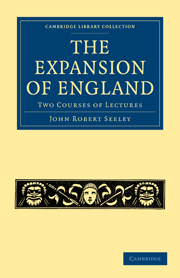Book contents
LECTURE V - MUTUAL INFLUENCE OF ENGLAND AND INDIA
Published online by Cambridge University Press: 05 August 2011
Summary
In the last two lectures I was engaged in showing that the conquest of India and the government of it by the English have in a certain sense nothing wonderful about them. We may fairly be proud of many particular deeds done by our countrymen in India and of many men who in India have shown a rare energy and talent for government, but it is a mistake to suppose that the Empire itself is a standing proof of some vast superiority in the English race over the races of India. Without assuming any such vast superiority we are able to assign causes which are sufficient to account alike for the growth and for the continuance of that Empire. It is not then wonderful, if by wonderful be meant simply miraculous, or difficult to account for by ordinary causation.
Nevertheless there is a sense in which it is not only wonderful, but far more wonderful than is commonly understood. It is wonderful rather in its consequences than in its causes. In other words, it is great in the peculiarly historical sense, for the pregnancy of events, as we remarked, is what gives them historical rank. By applying this test we raised the rank of several events in English history, especially the American Revolution, which for want of dramatic or romantic interest are too little studied. Let us now remark that the Indian Empire, however it may seem less marvellous on close examination than at first sight, will be found to gain in historic interest, as much as it loses in romantic.
- Type
- Chapter
- Information
- The Expansion of EnglandTwo Courses of Lectures, pp. 235 - 253Publisher: Cambridge University PressPrint publication year: 2010First published in: 1883



